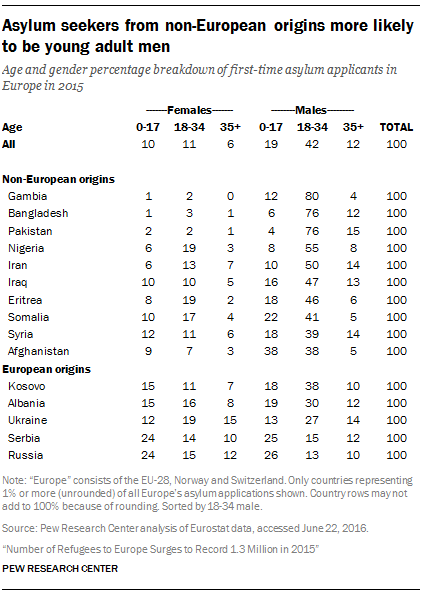Top Stories
An Argument Against Open Borders and Liberal Hubris
Progressives should remember that civilisation is not a science laboratory.

No one except a militant nativist would deny that some level of immigration is beneficial and should be accepted. After that, we face a question of scale. There are those, however, on the opposite end of the spectrum, who believe that no level of immigration should ever be denied. These are advocates of “open borders”; an idea as strange as that of the nativist—yet more dangerous for being considered respectable.
The liberal Economist magazine contains an essay promoting open borders. It imagines a world in which people are free to live and work wherever they please. It is an astonishingly biased and unreflective piece, which illuminates dangerous extremes of progressive utopianism:
Perhaps I sound inhuman. Who could dislike people living and working whereever they please? It can be a splendid thing, but if everybody did it think of what that would entail. The Economist reports that if borders were opened, 630 million people would be likely to migrate. Perhaps 138 million would go to the US, expanding its population by almost a half. About 42 million would join the British, expanding their numbers by more than a half. How many would go to Australia, a country with a population of 24 million, and with infrastructure already under strain? Such influxes would pose monumental demographic changes, soon made more dramatic by the higher birth rates. It will be exacerbated by the fact that local governments will not be able to keep up with the building of roads, hospitals, schools and transport systems that citizens—both old and new—will demand.
These predictions might be overestimates, the author tells us. This is true. But they could also be underestimates. When Poland was admitted to the European Union far more migrants flooded into Britain than was expected.
But what of proposed merits of open borders? A consistent failure of the Economist’s article is a reluctance to distinguish between different migrants. If one finds the study, it turns out that 54% of the men and women who expressed a desire to migrate came from Africa and the Middle East —with another 20% being from Central America. Yet the most successful immigrants, in terms of launching businesses and earning wealth, have been found to hail from Asia and Europe. A UCL study found that European immigrants to Britain contribute more to the economy than they take from it while the opposite is true for non European immigrants. It is senseless, then, to claim, as the author of The Economist article does, that immigrants are “more likely than the native-born to bring new ideas and start their own businesses”. Immigrants do not come from “Immigrantland”. Population differences related to entrepreneurial and earning potential are real, and significant, and difficult to bridge.

The author keeps on his rose-tinted spectacles as he considers negative effects of immigration. “A study of migration flows among 145 countries between 1970 and 2000,” we are told, “Found that migration was more likely to reduce terrorism than increase it.” The year before 2001 is a strange time to stop considering data on terrorism, and besides, the actual study found that terrorism was reduced only where they migrated from, not where they migrated to. “In some European countries, such as Sweden,” the authors admit, “Migrants are more likely to get into trouble than locals, but this is mostly because they are more likely to be young and male.” Again, this is hardly reassuring when 73% of migrants to Europe are young males.

But perhaps I am not dealing with the arguments for open borders at their best. For that, one can turn to Open Borders: The Case; an admirably and imposingly extensive resource. Here one finds grand speculation about economic blessings of free migration. For example, we find the claim—originating from a literature review by the economist Michael Clemens—that open borders could result in an increase of world GDP by 67% to a startling 147%. The main beneficiaries would be the migrants themselves, though that is not trivial. What is more damning from an economic perspective is that it would cause a surplus of unskilled labour. Open Borders founder Vipul Naik responded to this criticism by insisting that he could see no shortage of unskilled and semi-skilled work:
Until self-driving cars are a reality, there are ample job for personal drivers…There could be many more jobs for nannies, cooks, home attendants for elderly and disabled people, janitors, bus boys and girls at restaurants…Formerly eliminated jobs, like gas station attendants to fuel your car at the gas station, or movie attendants to show you your seat in the cinema hall, could be revived.
Why would they be revived? Nobody wants to pay for them. The only jobs he mentions that are difficult to fill are in social care. Although technically care work is “low skilled” it is not comparable to factory work, it requires a special kind of applicant who possesses the personal traits of empathy, diligence and agreeableness. Low standards in the UK in care work have resulted in horrifying case studies of incompetence, neglect and abuse.
Then are the social and political consequences. Nathan Smith, an economist, writing for Open Borders, published a speculative essay in which he imagined a future world in which borders had been flung open. For this advocate of free migration, an influx of migrants into the West would demand “improvisational and authoritarian expedients”, such as the end of the welfare state and equality of opportunity. “Natives would retreat into gated communities.” “Law enforcement would often be baffled by new and complex challenges.” “Local stirrings of revolt [could] transform the [national] psyche enough to make weapons training in school or even universal conscription into some sort of national police force attractive.” Migrants would work in “modern latifundia” for “pay rates that would strike native-born [Westerners] as a form of slave labour”. This vision of starkly divided, viciously authoritarian societies is his optimistic view, for Smith remains confident that free migration would encourage “a continuous surge of booming economic growth” which, presumably, would disincentivise civil strife between fearful, resentful and unequal classes.
But most of us would not roll those dice. Some of us would not even think it worth handling.
Arguments for open borders are based not merely on economics but on ethics. Open borders advocates tend to be “moral egalitarians”; that is, they believe in treating human beings symmetrically. The economist Bryan Caplan often asks his readers to imagine how they would feel if trapped in impoverished and tyrannical states. Well, badly, of course. But how would Bryan Caplan feel as a member of the underclass within his own society as Nathan Smith imagines? Presumably badly as well. So, what does this tell us? Not much, really. Empathy is a fallible guide in politics.
Caplan is critical of the in-group bias that leads us to care more about their countrymen than foreigners. It is the same in-group bias, in a stronger form, that leads us to buy presents for our family and friends rather than donating to the poor. We have concentric circles of empathy, which means that the less direct our connections to people the less we are invested in their wellbeing. So, we nest our loyalties; we put our families first, and then our friends, and then our neighbours; then, perhaps, our countrymen and then mankind at large. This by no means makes us indifferent to foreigners. We can care about their lives, and try to help them. But the limits of our loyalties make nations convenient units of humanity, and explain why we put the interests of our nations first.
This is not just true of Europeans and Americans. Arguably, mass migration helped give us Brexit and Trump, and protests against mass migration policies have erupted across the world, from Singapore to South Africa. This is not to give blanket cover for anti-immigration sentiment—which can often be irrational, hysterical and even cruel—but to suggest that humans feel a natural oikophilia that is at odds with the rapid change produced by mass migration.

Immigration is important. As an immigrant myself who is delighted and grateful to have been accepted by my hosts, I very much appreciate this. It needs rational and humane consideration. But the respectable extremism of open borders advocates, who, on the basis of dubious projections, would transform our societies, exposing them to radical division and strife, should concern us; less because their wishes are likely to be granted than because the seriousness with which they are taken shows that even more moderate liberals are radical on this matter.
We do not have open borders but we are experiencing unprecedented demographic change. What progressives should remember is that civilisation is not a science laboratory. The consequences of failed experiments endure. That is the main virtue of gradual change; we can test new waters and not leap into their depths.






